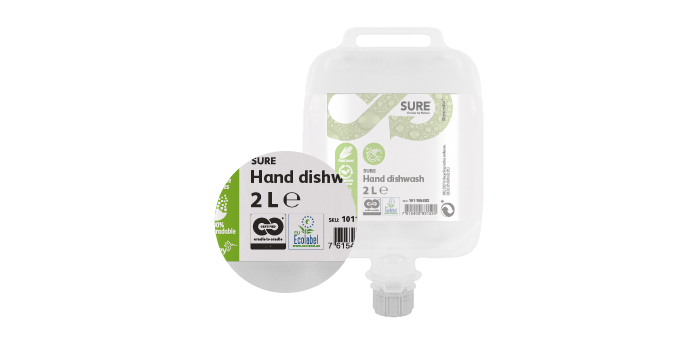Sustainable cleaning and sustainable products explained.
Sustainable cleaning products are hygiene products that, throughout their lifecycle - from their raw materials, and usage, to disposal of their packaging - leave little to no lasting impact on the environment. The meaning of 'sustainability' isn't as simple as its basic definition, especially in the context of cleaning products.
Many assume that the preservation of natural environments is all it ever meant, but the human side of producing and consuming cleaning products means that a form of equity has to exist with these products. They need to be able to afford to access these sustainable cleaning products economically, know they aren't surrendering the sanctity of the natural world, and can also be confident that the production of these products is protected against socia
We've mentioned how sustainable cleaning is something of a buzzword in the industry. It's accompanied by similar phrases, like green cleaning and eco-friendly cleaning which are not specifically included in standards or recognized by regulatory bodies. They're effectively marketing terms.
There are countless sustainable cleaning product certifications to choose from, but the best sustainable cleaning brands will boast these sorts of seals on their products as signs of meeting the highest standards and consistent demonstrations of sustainable cleaning goods.

The EU Ecolabel is also known as the EU flower and facilitates a European standard for sustainable products. To be awarded the EU Ecolabel, products must meet stringent criteria and pass compliance tests, in a process verified by an independent, publicly accountable body.
Nordic Swan is very similar to the EU Ecolabel but an official eco-labeling scheme common to the entire Nordic region.
Ecocert certification is a well-known label for organic products worldwide? everything from textiles to agriculture to food to organic and natural cosmetics.
Cradle to Cradle Certified is a globally recognized benchmark for safer, more sustainable products made for a circular economy. To become certified, products are assessed on their environmental, safety, and social performance.
Ecolabels can thus be a useful way of communicating a product's environmental credentials in a simple, credible manner.
Unfortunately, there is no globally accepted set of criteria. There are also no eco-labeling schemes for certain types of cleaning products, such as sanitizers or disinfectants. Adopting an eco-label only policy may therefore exclude products vital for hygiene.
And, equally important, perfectly acceptable and compliant products could be excluded for simply not having an eco-specific label, for example, new technologies that accomplish cleaning via novel means might not be certifiable by the existing schemes.
While recognizing the role ecolabels play by simplifying a sometimes complicated message, ecolabels will never be the single goal when developing or selecting sustainable products.
A commitment to sustainability goes beyond just certification to help customers with their broader sustainability goals. Greener and safer chemistry is crucial, but so are product efficacy, packaging, logistics, and waste disposal.
Greenwashing is about making an environmental claim that is unsubstantiated (a fib) or irrelevant (a distraction). It is an exaggeration of environmental credentials or the use of terminology such as "eco-friendly" or "sustainable" which are vague and not verifiable. True green products will often be certified, be clearly labeled, and provide evidence to back up the claims that are being made.
Some brands are highly dedicated to their sustainability standards and choose to make positive choices in all aspects of how they make and sell goods. It's no surprise that many of them are highly successful against their competitors as increasingly environmentally-conscious consumers seek out these suppliers.
As we've explored, the aim is not to simply take marketing at its word, or assume the largest companies will make the right choices. To find sustainable cleaning products that will preserve the planet for future generations, look for labels you can trust and that are respected across the industry, like EU Ecolabel, Nordic Swan, or Cradle-to-Cradle.
The same goes for phrases you see on the packaging. Make sure that claims and words used are supported by factual data, further evidence, or independent certifications.
If you know what to look for, and what to question, you'll begin to recognize these companies and be able to contribute positively to the environment in meaningful ways through your cleaning practices.